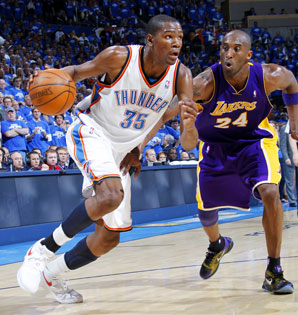What wrong with Lakers? Many things, but all are fixable
Kobe Bryant has a problem. Bryant's body has become a game of Operation, with lingering knee, ankle and finger issues contributing to his 38.4 field goal percentage, the lowest in the postseason since his rookie year.
Ron Artest has a problem. Artest has done a credible job on Kevin Durant this series, limiting him to 38.4 percent shooting, despite getting drilled with three or four screens on virtually every possession. But after four games, it is clear Artest (seven points per game on 30.0 percent shooting, including 13 percent from three-point range) is still struggling to grasp the nuances of Phil Jackson's triangle offense.
Derek Fisher has a problem. His name is Russell Westbrook. Westbrook is a point guard in a running back's body and has used his strength and speed advantages over Fisher to wreak havoc in the lane and open up shots for Durant, James Harden and Jeff Green.
The Lakers, however, feel these are manageable problems. Bryant sat out Monday's practice and said he "feels good" going into Tuesday Game 5. Artest, in turn, believes the attention being paid to his poor offensive output will dissipate once Bryant gets his offense going.
Fisher, meanwhile, may not be able to stay in front of Westbrook, but Jackson says his others can back up Fisher by taking more charges. Despite the Thunder's relentless assault on the rim in Game 4, the Lakers didn't take a single one. Taking charges, Jackson reasons, will also close the wide gap in free-throw attempts (82-40) in Games 3 and 4.
"You have to take charges," said Jackson. "You watch these playoffs ... you see all these teams taking charges. Referees will honor the fact that if you put your body on the line and take a charge you can stop them from penetrating. You have to put bodies in front of the drivers."
There is one problem L.A. has encountered that isn't as easy to solve: speed. Or, more appropriately, a lack of it. Oklahoma City is faster than the Lakers at nearly every position. And it has taken advantage of that edge. In Game 3, the Thunder won the fast break battle 23-7, an edge that helped them squeak out a five-point victory. In Game 4, the Thunder outscored the Lakers in transition 24-2. Jackson noted that of the 18 threes his team missed in Game 4, the Thunder converted nearly 60 percent of them into scores.
"Oklahoma is inconsiderate of our team speed," said Jackson. "They will throw all five of their guys on the boards without defensive balance and we are unable to take advantage of it. It's the same thing on the other end of the court: They will throw all five guys in to rebound. They think that our team speed isn't enough to break them back down the other way."
Said Bryant, "Their speed is remarkable. We are obviously not as fast. We have to do a much better job of protecting the paint and not allowing them to get as many easy points."
That's easier said than done. The Thunder developed into a lethal running team during the regular season, averaging 17.1 fast-break points after the All-Star break. And without the size to match up with the Lakers in the half court, Oklahoma City plans to push the tempo as often as it can.
"There's no doubt we have to [run] against them. We can't play their rhythm," said Thunder coach Scott Brooks. "Their rhythm is really good when it's at their pace and their spacing of their offense kind of lulls you to sleep a little bit. We can't allow that to happen."
The Lakers believe the key to slowing the pace is as simple as making shots.
"You have to be efficient offensively," said Fisher. "You have to take smart shots -- shots that come out of your offense. The [shots] that don't come out of our offense are the ones that are causing us the most problems. From there, there are going to be times when guys take quicker shots. We just have to literally sprint back."
In fact, the overwhelming sentiment expressed at the Lakers' practice was that they still controlled their own destiny. Jackson said that "sound offense provides rebounding and defensive balance." Fisher said he "didn't think [the team] should be worried." And Bryant sniffed at the suggestion that L.A.'s backs are against the wall.
"A lot of credit goes to [the Thunder] and how they executed and how they ran," said Bryant. "But we can do a much better job."





